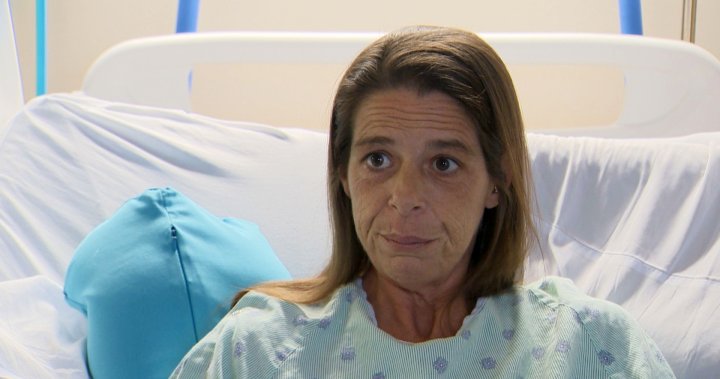Kaia’tanóron Dumoulin Bush knew she was an artist from a young age, and she wasn’t the only one.
Growing up in Châteauguay, Que., an area on Montreal’s South Shore known also known as Oshahrhé:’on, her passion for drawing was evident to her kindergarten teacher — who knew she would be an artist.
“I kind of always knew this was going to happen one way or another,” says Bush, who now also creates paintings, sculptures and art installations. “This was meant for me.”
A big inspiration in her childhood was Japanese anime and manga (cartoons and comic books), which can be seen in her work today.
“I’m part of the Pokémon, Sailor Moon, Saturday morning cartoons generation,” she says, adding she was drawn to the idea of “having magical powers, and being able to become something bigger than yourself and maintaining your own agency.”
Bush is one of three artists who created original artwork for the CBC podcast Telling Our Twisted Histories.
Listen to: God

Her artwork for the episode “God” is filled with bright, fluorescent pink, a colour Bush reaches for often.
“My mom is French Canadian, my dad is Mohawk. So when you get the red and white [together] it becomes pink, and that’s where I sit in that colour spectrum,” she says.
And she also finds inspiration in the bright colours seen at contemporary powwows.
“I was able to find a place for me within those colours,” she says.
A Catholic cross is the largest element in the piece, but it is adorned with imagery inspired by Haudenosaunee floral patterns.
In its centre, a young girl is seen asking for God’s help, with no response. It mirrors her own complicated relationship with faith and the thousands of children who died in Canada’s residential school system.
“As Indigenous people, our spirituality was taken away from us. And we’ve been told what we held as sacred truth was wrong,” said Bush. “Now it’s changing, there’s space for different beliefs now and different truths.”

Bush worked in a primary school in Kahnawake and enjoyed her own time in school, so she sought to reconcile her own experience with the damage caused by residential schools.
“I’ve always loved school, always loved learning. It was always a place for me to feel secure, and when I felt good. And that’s not the experience for many Indigenous people,” she says.
Sections of the the piece are filled with aggressive lines, symbolizing “Indigenous people moving through environments designed to hold them back.”
She wanted to create a kind, happy world, while honouring all the victims of the residential school system.
“That word is so heavy and so loaded. I didn’t want my positive experience to obscure the truth of the issue,” she says.
Listen to: Obey

Her work for the episode “Obey” also pulls from the themes of God and school, inspired by a painting that was in the Catholic church she attended as a child.
An Indigenous girl is in the lap of a white nun, with other girls gathered around. In her recreation of the painting, she includes her own perspective, showing herself and her sister looking on, processing their own ideas of faith and obedience.
“It’s supposed to be, I think, a sweet painting but it’s definitely something a bit more sinister to me,” she says.

Bush’s work for the episode “Reconciliation” includes a cake motif that she’s often used when exploring the subject.
“It just really brings together this saccharine and really saturated imagery for me,” she says. “An almost acidic kind of look to it.”
Prime Minister Justin Trudeau can be seen on the cake, as well as felled trees and polluted water. She says that sweetness is deceptive, hiding something rotten beneath the icing.
“There are a lot of good things going on in this country, but at the same time it’s built on genocide and there’s a lot of deception about it, as we’ve seen recently,” she says.
“People hide it, they don’t talk about it. A lot of Canadians don’t know their own history.”
Kaia’tanóron Dumoulin Bush’s work will be featured in Moulin à paroles | Iakoteriwatié:ni | Chatterbox at the daphne art centre from Oct. 30 to Dec. 18.
Telling Our Twisted Histories is an 11-episode podcast series that reclaims Indigenous history by exploring 11 words whose meanings have been warped by centuries of colonization. In it, host Kaniehti:io Horn (Letterkenny, The Man in the High Castle) guides listeners through conversations with more than 70 people from 15 Indigenous communities whose lands now make up Quebec, New Brunswick and Labrador. All episodes are now available at CBC Listen.







More Stories
B.C. civil lawsuit against Sex Pistols guitarist alleges 1980 sexual assault | CBC News
Montreal actress calls Weinstein ruling ‘discouraging’ but not surprising
Estate of Tupac Shakur sends cease-and-desist letter to Drake over AI vocals